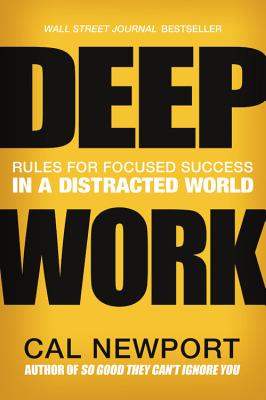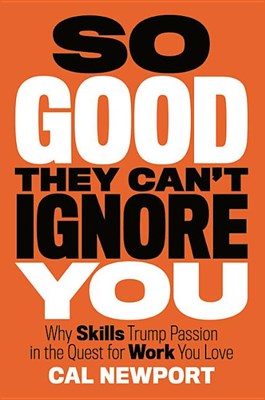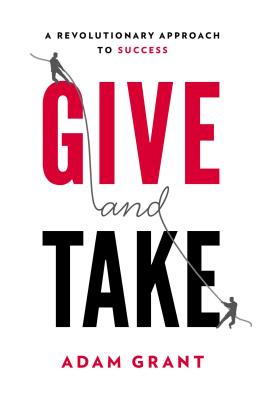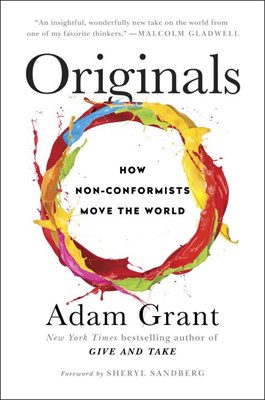Deep Work: Rules for Focused Success in a Distracted World
January 07, 2016
Cal Newport details the advantages of deeper focus and concentration, of "deep work," and how to cultivate it.
Deep Work: Rules for Focused Success in a Distracted World by Cal Newport, Grand Central, 288 pages, $28.00, Hardcover, January 2016, ISBN 9781455586691
Cal Newport’s new book, Deep Work, carries on and furthers a conversation I’ve been fascinated with for years about the effects of technology and the internet on how we think and work. In it, Newport demonstrates how, and why, we should get out of what Nicholas Carr termed The Shallows (in his book of that name), and hone the ability to enter a state of deeper concentration and focus—an ability Carr lamented was being lost in the digital age.
But lets back up a moment to Carr’s last book…
Because in that book, So Good They Can’t Ignore You, Cal said something I had been waiting for someone writing in the business genre to say for years. At a time when most career advice, personal development books, and commencement speeches were glorifying the pursuit of passion, setting off on one’s own, finding your true calling, and doing what you love, Newport said, basically, get to work. Not only that, but stick with it, form a craftsman mindset about your work, know it well, and get really good at it. In essence, he counseled readers to move their focus “away from finding the right work and toward working right,” to build a love for what they do.
Newport once again challenges the dogma of the day in Deep Work, arguing that the shiny new network tools available to, and all the rage in, business today are undermining our ability to dive deep and do our best work. And though the book does trend toward the philosophical at times, he does not dive into larger philosophical debates and arguments around what this is doing to society as a whole. Newport hones in on what it means specifically for our work, and for working individuals. And then he moves on to build on the message and applicability of So Good They Can’t Ignore You by describing how to get better at doing our work.
One thing is certain: as we enter an age of intelligent machines, the nature of work is changing. It has been referred to as The Great Restructuring. In this restructuring, Newport tells us, there are three groups doing extremely well. The first two Newport refers to as High-Skilled Workers and The Superstars: those who are good at working with and programming intelligent machines—manipulating databases, entering complex formulas tied to high level reasoning and teasing out answers and solutions, and developing the languages and platforms these machines use. These are people like Nate Silve (the statistician you may know from his election forecasting at FiveThirtyEight) and David Heinemeier Hanson (a programmer who built Ruby on Rails and cofounded Basecamp). The third group is, of course, The Owners of those machines—people like venture capitalist John Doerr. The rest of us need to develop two core abilities to thrive in the new economy:
- The ability to quickly master hard things.
- The ability to produce at an elite level, in terms of both quality and speed.
Both of these abilities, Newport argues, “depend on your ability to do deep work.”
And that ability is becoming incredibly rare at the same time:
The reason knowledge workers are losing their familiarity with deep work is well established: network tools. This is a broad category that captures communication services like email and SMS, social media networks like Twitter and Facebook, and the shiny tangle of infotainment sites like Buzzfeed and Reddit. In aggregate, the rise of these tools, combined with ubiquitous access to them through smartphones and networked office computers, has fragmented most knowledge workers’ attention into slivers.
This is a fact that is no longer in serious debate. Most everyone accepts it, yet most also accept it as inevitable. The problem is that this is not the world the most successful people live in. Cal points us to examples of extremely productive people, ranging from historical examples like Carl Jung and Mark Twain to contemporaries like Adam Grant—author of Give and Take, and the upcoming Originals—to make a point that the most productive people are those that are able to cultivate and protect their time to do deep work. (The one exception may be elite management roles that require juggling many things at once, and being informed, in-touch, and accessible at all times, in real time. The fact that leadership roles may require this connectivity may be one explanation for why network tools are so popular in organizations.)
The first part of Deep Work is dedicated to “The Idea,” or his hypothesis of deep work, both its advantages, and current erosion by technology. (I suppose I should point out here that Cal Newport is no slouch or luddite; He is "a theoretical computer scientist who performed [his] doctoral training at MIT's famed Theory of Computation group," has published four books, and is a professor at Georgetown University.) He argues that the current “ubiquitous culture of connectivity” is perhaps more of a cult, one that puts shiny new tools on high, while distracting us and lessening our ability to reason and produce at a higher level. In fact, he has a section in Chapter Two entitled “The Cult of the Internet” in which he bemoans the internet-centrism of the day (brilliantly setting the conversation up with ideas from communication theorist Neil Postman and social critic Evgeny Morozof). None of this should be inevitable, he believes, yet to most it is now unquestioned:
We no longer see Internet tools as products released by for-profit companies, funded by investors hoping to make a return, and run by twentysomethings who are often making things up as they go along. We’re instead quick to idolize these digital doodads as a signifier of progress and a harbinger of a (dare I say, brave) new world.
So there is an uproar, disbelief, and general mocking of one of our most successful novelists, Jonathan Franzen, when he suggests novelists shouldn’t tweet. Reporters like Alissa Rubin of the New York Times, whose in-depth, in-the-field reporting is a cultivated and serious craft devoted to developing deep content, are strongly urged by their employer to “regularly interrupt this deep work to provide, for free, shallow content to a service run by an unrelated media company based out of Silicon Valley.”
Simply put, in an “era where anything Internet related is understood by default to be innovative and necessary,” Newport says (though I’m placing his words out of order), “there is a cacophony of voices attempting to convince knowledge workers to spend more time engaged in shallow activities.”
It is a trend that compounds other trends in the modern workplace—open office plans (we have one here, and I love it, but I’m glad we’ve recently moved into a larger space that provides places I can get away from it), the expectation of quick responses to email and other messaging services, regular pop-up meetings—that makes deep work seem almost anachronistic. As Newport puts it:
Many other ideas are being prioritized as more important than deep work in the business world, including … serendipitous collaboration, rapid communication, and an active social media presence.
It’s bad enough that so many trends are prioritized ahead of deep work, but to add insult to injury, many of these trends actively decrease one’s ability to go deep.
So, it is for these reasons deep work is becoming so rare. So what to do about it? Read the second part of the book, “The Rules.” It is here, in the last two thirds of the book, that you’ll learn how to develop the ability to dive deep, to help you in “rebuilding your life around deep work.”
Part Two is much longer because it’s much harder. It requires the reader to go beyond understanding and “move beyond good intentions and add routines and rituals to your working life.” It requires commitment. This is where the rubber really meets the road, and it can seem daunting at times. But Newport boils it all down to Four Rules:
- Work Deeply
- Embrace Boredom
- Quit Social Media
- Drain the Shallows
The section on working deeply is the longest and most involved. It is a wonderfully entangled, intertwined, and erudite series of strategies, philosophies, disciplines, and techniques to sharpen your focus and dive deep into your work. Not all will be right for you, but the section is so rich in resources and instruction that you’re sure to find something that you can tailor to your circumstance.
Perhaps the most daunting part of it all for some is the idea to “quit social media,” but that rule’s title is a little more harsh than what it entails. What Newport really has a problem with is that very binary setup to the question of social media: either give yourself over to these new tools, or absolve yourself of them completely. Newport offers and appropriately nuanced middle ground, which he illustrates very smartly with the example of a farmer he knows near Washington D.C. that decided to sell his hay baler. The tool, while offering the easy benefit of being able to harvest hay on his own land, offered many downsides, including the time he’d have to spend harvesting it—time he could spend doing more productive and lucrative farming activities—and most importantly the lessened soil quality that would result in the baler compacting his soil as it drove back and forth across it. Newport suggests knowledge workers take a similarly deep look at the costs and benefits of using network tools. All of them offer some benefit, but we rarely look at what we lose when we employ them (or simply chalk those losses up to some “new reality” we all must work in).
The other two rules, to “embrace boredom” and “drain the shallows” are meant to give your brain some free time to roam and recharge, and a greater ability to refocus when called upon, and to eliminate as much “shallow work”—that work that is using up our cognitive capacity without producing much of any value—from your day as possible.
Beyond these tools, like any good work of academic scholarship, Deep Work references so much of the work that his is built on, and my reading list on these topics has grown by a dozen books (and this is a field I thought I was well read in.)
At the end of it all, if you can escape the shallows and “deploy your mind to its fullest capacity to create things that matter,” Cal Newport believes that you will find that deep work creates the best work, that “A deep life is a good life.”





